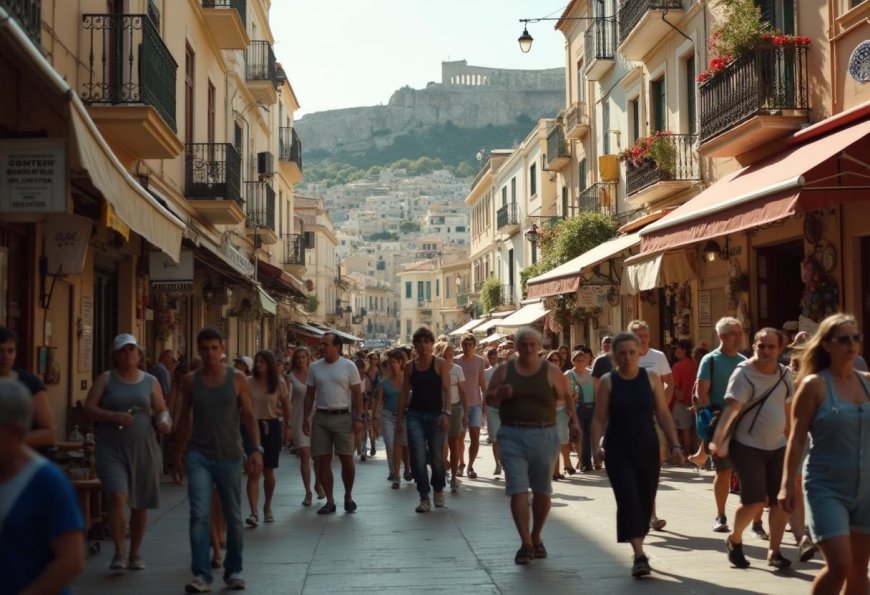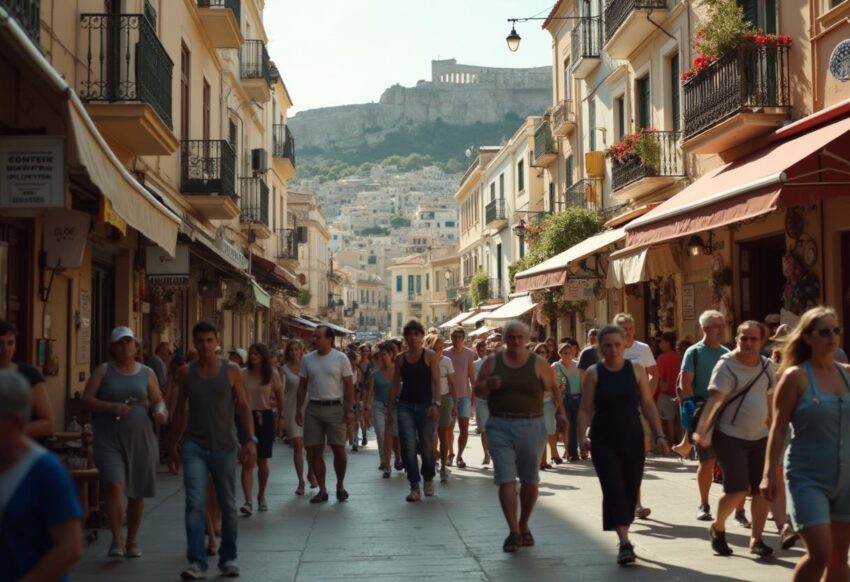Historic Plaka District In Athens Overwhelmed By Tourism And Rising Costs


Athens has become a massively popular city for tourism, and is expected to reach over 10 million visitors by 2025, marking a 2 million increase from 2024. This growth has certainly benefitted the local economy; however, it has also sparked social conflict, particularly in the Plaka district. Also known as the neighborhood of the gods, Plaka has a rich historical and cultural significance. It is known to be situated under the Acropolis and is now heavily marketed as a tourism hotspot. This has led to an increase in locals opposing the overexploitation of the area, while its essential character has been utterly transformed.
Residents’ Association representative and Plaka district resident, Giorgos Zafeiriou, lamented how unrestrained tourism is causing increased erosion to cultural authenticity and historic identity. He, like the rest of the residents, heavily reminisces about the authentic charm and quiet character of the district. Instead, they are now forced to bear the unrestrained flood of constant tourists coming to Greece. It has become clear that an increase in tourism in the country is benefiting the economy as a whole; however, it is posing a challenge in trying to balance the obliteration of local heritage as a result of reckless tourism.
Plaka: The Oldest Neighbourhood of Europe Strangled by Over-Tourism
Found at the foot of the Acropolis of Athens is referred to as the oldest living district in Europe. The Greek cafes and pubs, streets from the Ottoman and Byzantine times, and the numerous historic landmarks showcase the remarkable history of the country as well as the rich culture it possesses. It is without doubt that Plaka serves as a captivating part of Athens; however, the increasing number of tourists that visit each year is contributing to the streets of Plaka becoming busier and congested.
As a part of the tourist association, Lydia Carras has aimed to protect the heritage of Plaka and is extremely petrified of the increasing number of tourists that are visiting the site. She does mention the benefits of Plaka on the rest of the economy; however, she also stated that such benefits could strip the neighborhood of its identity, which would only further the gap in the relationship the locals are expected to have with a region that has been their neighborhood for decades.
Tourism as a Double-Edged Sword
Tourism virtually single-handedly revived the Greek economy while also allowing the country to recover from the years of austerity stemming from the 2008 global financial crisis. As a souvenir shop owner in Plaka, Konstantinos Marinakis acknowledged, the boom in tourism fostered a Greek economic miracle. Marinakis observed that the country’s recovery has, in part, been supported by the robust performance of the tourism industry, as a large portion of the local population is now benefiting from the increased international visitors.
To this prosperity, however, a deep-rooted dual dilemma poses the sharp rise in the cost of living, especially for the residents in Plaka. Coupled with a rising demand for short-term rentals, locals have become displaced from their neighborhoods. Residents often end up living in direct conflict with the visitors as tourists are blamed for paying, exacerbating the local culture prices and pushing locals out. This scenario is not limited to the sphere of Athens, as other cities that serve as capitals for tourism, such as Barcelona or Venice, face the same challenges.
The Increasing Pressure on Plaka
The rapid development of Plaka’s tourism sector has led to a disproportionate change in the neighborhood’s demographics. Tourists have outnumbered locals, especially during the summer. Actual data regarding the number of tourists in Plaka is difficult to obtain, as census data is reported at the level of Athens as a whole. Nevertheless, it is estimated that the neighborhood’s population of 2,000 residents can be inundated with 8,000 tourists on any given summer day.
To alleviate the burning issues, Athens Mayor Haris Doukas accepted the burden of dealing with the problem of overtourism, which has affected Plaka and similar areas as visitor magnets. He noted that Athens takes pride in being one of the top ten cities in the world with the most international visitors, but there is a need to manage the tourism systems and their effects on the neighborhood of Plaka. While expressing pride in the tourism numbers, Doukas noted that it is critical to put in place intervention strategies before it is too late, as it is in cities like Barcelona.
Obstacles in Addressing Overtourism Concerns
Athens is making efforts to manage highlighted problem areas and mitigate some impacts of overtourism within the city. A separate enforcement team is now in charge of monitoring designated “intervention zones” to ensure compliance with the restoration and preservation efforts of Plaka’s Historical Center. This team works in conjunction with the police to make certain that the pavements are free from dining terrace intrusions and that parking does not block pedestrian access.
Although these policies are commendable, there is still work to be done. Dimitris Melissas, an urban planner and attorney, remarked that the city’s attempts to control the problem have not been successful. He noted that numerous buildings in Plaka have been transformed into several short-term rental apartments, which in reality function as hotels. This practice has led to a dramatic increase in the availability of housing that is rented out on a short-term basis, making it impossible for residents to afford housing in the area.
Legal Controversies Associated with Short-Term Rentals
Melissa is fighting a legal battle against several properties located in Plaka that have been transformed into short-term rental establishments, claiming that they function as unlicensed hotels. He is currently in the country’s highest administrative court, the Council of State, from which a decision is anticipated by the end of September. The decision of this case could have an important legal impact on the arm of the legal system that involves governance of short-term rentals in Athens.
Steps have already been taken to curb the number of new short-term rental registrations in the center of Athens. Regardless of these restrictions, Melissa’s concerns about the impact of such policies remain, especially considering that advertisements for short-term rental listings continue to flood local newspapers. He believes that the government is doing something in regard to the tourist industry; however, the greater issue is the enforcement of any rules formulated in regard to tourism.
Safeguarding Athens’ Legacy for Posterity
Residents of Plaka, together with preservationists such as Carras, have made active efforts to make sure that their neighborhood does not lose its cultural identity to the growing tourism industry. Work continues to find a middle ground between the economic benefits of tourism and the preservation of local life. Greece’s economy relies heavily on tourism, but it is equally important to find sustainable methods of managing it, especially in culturally sensitive regions like Plaka.
The continued and intensifying influx of visitors to Athens is a double-edged sword as it brings economic opportunities while threatening historic sites. Plaka is a microcosm of the problems associated with overtourism that many cities across the globe face, and finding strategies to tackle them is important to ensure that tourism is a boon for both the economy and the local population.
(Source: Giorgos Zafeiriou, Lydia Carras, Konstantinos Marinakis, Mayor Haris Doukas, Dimitris Melissas, Ellet Association, Athens Residents’ Association)
The post Historic Plaka District In Athens Overwhelmed By Tourism And Rising Costs appeared first on Travel And Tour World.






